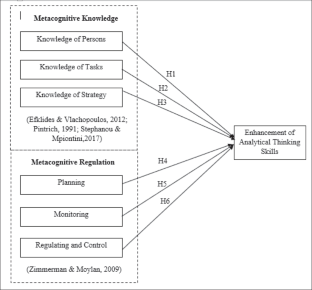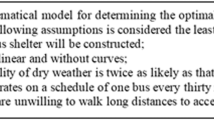Abstract
Enhancing students' analytical thinking skills holds great promise for bolstering a nation's economic growth, fostering a dynamic learning culture, and nurturing human capital development. It is especially critical in today's rapidly changing landscape, where the demand for skilled, adaptable graduates is high. Achieving and sustaining these skills hinges on individuals' awareness of their own thinking processes. Thus, this study aims to investigate the relationship between metacognitive knowledge and analytical thinking among university students in Malaysia. Besides, it assesses the impact of metacognitive regulation and control on analytical thinking. Data was gathered by administering web-based questionnaires to students enrolled in two public universities and two private universities situated in Malaysia's central region. Employing convenience sampling, a total of 184 respondents participated in the survey, responding to 5-point Likert scale questionnaires designed to gauge metacognition (both knowledge and regulation) and analytical thinking. The data analysis was conducted using Partial Least Squares Structural Equation Modelling (PLS-SEM), a technique chosen for its suitability to handle complex relationships within the study variables. PLS-SEM, coupled with the bootstrapping method, was employed to ensure a robust examination of the interactions among metacognitive factors and analytical thinking. The use of the bootstrapping method enhances the reliability of the results by generating multiple resamples and assessing the stability and significance of the model parameters. The results revealed a significant relationship (p < 0.01) between metacognitive knowledge and analytical thinking, with knowledge of persons and knowledge of strategies proving to be influential in enhancing analytical thinking abilities with the correlation coefficients (R-values) of 3.528 and 3.815, respectively. In terms of metacognitive regulation, this study identified a noteworthy positive impact, highlighting the role of metacognitive regulation and control in bolstering analytical thinking with an R-value of 2.985. These findings have far-reaching implications for educators, offering valuable guidance on empowering university students to become more self-reliant and efficient learners by imparting skills in planning, monitoring, and self-assessment of their learning processes for improved academic performance within the university environment. This, in turn, has the potential to yield improved academic performance, particularly the development of analytic thinking and offers educators the opportunity to craft more effective instructional materials and activities tailored to harness the power of metacognition in education.



Similar content being viewed by others
Data availability
The datasets generated during and/or analysed during the current study are available from the corresponding author on reasonable request.
References
Anthonysamy, L. (2023). Being learners with mental resilience as outcomes of metacognitive strategies in an academic context. Cogent Education, 10(1). https://doi.org/10.1080/2331186x.2023.2219497
Anthonysamy, L., Choo, K. A., & Hin, H. S. (2020). Self-regulated learning for smart learning in a university at Cyberjaya. In Understanding digital industry (pp. 108–111). Routledge. https://doi.org/10.1201/9780367814557-27
Anthonysamy, L., Ah Choo, K., & Soon Hin, H. (2021). Investigating self-regulated learning strategies for digital learning relevancy. Malaysian Journal of Learning and Instruction, 18. https://doi.org/10.32890/mjli2021.18.1.2
Areesophonpichet, S. (2013). A development of analytical thinking skills of graduate students. In The Asian Conference on Education (pp. 1–5). The International Academic Forum.
Azmi, I. A. G., Hashim, R. C., & Yusoff, Y. M. (2018). The employability skills of Malaysian university students. International Journal of Modern Trends in Social Sciences, 1(3), 1–14.
Bandura, A., & Cervone, D. (1986). Differential engagement of self-reactive influences in cognitive motivation. Organizational Behavior and Human Decision Processes, 38(1), 92–113.
Barnard, L., Lan, W. Y., To, Y. M., Paton, V. O., & Lai, S.-L. (2009). Measuring self-regulation in online and blended learning environments. The Internet and Higher Education, 12(1), 1–6.
Baumeister, R. F., Vohs, K. D., & Tice, D. M. (2007). The strength model of self-control. Current Directions in Psychological Science, 16(6), 351–355.
Brown, A. L., & Campione, J. C. (1996). Psychological theory and the design of innovative learning environments: On procedures, principles, and systems. In R. Glaser (Ed.), Innovations in learning: New environments for education (pp. 289–325). Erlbaum.
Brown, A. L., & Campione, J. C. (2013). Psychological theory and the design of innovative learning environments: On procedures, principles, and systems. In Innovations in learning (pp. 289–325). Routledge.
Byrne, B. M. (2013). Structural equation modeling with Mplus: Basic concepts, applications, and programming. Routledge.
Davidson, J. E., & Sternberg, R. J. (1998). Smart problem solving: How metacognition helps. In D. J. Hacker, J. Dunlosky, & A. C. Graesser (Eds.), Metacognition in educational theory and practice (pp. 47–68). Lawrence Erlbaum Associates Publishers.
Davies, A. (2019). Carrying out systematic literature reviews: An introduction. British Journal of Nursing (Mark Allen Publishing), 28(15), 1008–1014. https://doi.org/10.12968/bjon.2019.28.15.1008
Diamond, A. (2013). Executive functions. Annual Review of Psychology, 64, 135–168.
Dweck, C. S. (2006). Mindset: The new psychology of success. Random House.
Effeney, G., Carroll, A., & Bahr, N. (2013). Self-regulated learning and executive function: Exploring the relationships in a sample of adolescent males. Educational Psychology, 33(7), 773–796. https://doi.org/10.1080/01443410.2013.785054
Efklides, A., & Vlachopoulos, S. P. (2012). Measurement of metacognitive knowledge of self, task, and strategies in mathematics. European Journal of Psychological Assessment, 28(3), 227–239. https://doi.org/10.1027/1015-5759/a00014
Erlin, E., Rahmat, A., & Rejeki, S. (2020). Use of metacognitive regulation strategies to increase student academic achievement in microbiology course. Journal of Physics: Conference Series, 1521(4), 042016. https://doi.org/10.1088/1742-6596/1521/4/042016
Flavell, J. H. (1979). Metacognition and cognitive monitoring: A new area of cognitive–developmental inquiry. American Psychologist, 34(10), 906.
Gold, A. H., Malhotra, A., & Segars, A. H. (2001). Knowledge management: An organizational capabilities perspective. Journal of Management Information Systems, 18(1), 185–214.
Güner, P., & Erbay, H. N. (2021). Metacognitive skills and problem-solving. International Journal of Research in Education and Science (IJRES), 7(3), 715–734. https://doi.org/10.46328/ijres.1594
Hair, J., Jr., Hair, J. F., Jr., Hult, G. T. M., Ringle, C. M., & Sarstedt, M. (2021). A primer on partial least squares structural equation modeling (PLS-SEM). Sage publications.
Kounios, J., & Beeman, M. (2014). The cognitive neuroscience of insight. Annual Review of Psychology, 65, 71–93.
Ku, K. Y., & Ho, I. T. (2010). Metacognitive strategies that enhance critical thinking. Metacognition and Learning, 5, 251–267.
Kuhn, D., Dean, J., & David. (2004). Metacognition: A bridge between cognitive psychology and educational practice. Theory into Practice, 43(4), 268–273.
Lee, I., & Mak, P. (2018). Metacognition and metacognitive instruction in second language writing classrooms. Tesol Quarterly, 52(4), 1085–1097.
Li, M., & Yuan, R. (2022). Enhancing students’ metacognitive development in higher education: A classroom-based inquiry. International Journal of Educational Research, 112, 101947.
Lilian, A. (2021). Self-Regulated Learning Strategies for Smart Learning : A Case of a Malaysian University. Asian Journal of Research in Education and Social Science, 3(1), 72–83.
Lilian, A. (2022). Formulation of self-regulated learning strategies framework for digital learning for lifelong learning. Asian Journal of Research in Education and Social Sciences, 4(1), 24–32.
Magno, C. (2010). The role of metacognitive skills in developing critical thinking. Metacognition and Learning, 5, 137–156.
Mahanal, S., Zubaidah, S., Setiawan, D., Maghfiroh, H., & Muhaimin, F. G. (2022). Empowering college students’ problem-solving skills through RICOSRE. Education Sciences, 12(3), 196.
Molin, E., Adjenughwure, K., de Bruyn, M., Cats, O., & Warffemius, P. (2020). Does conducting activities while traveling reduce the value of time? Evidence from a within-subjects choice experiment. Transportation Research Part a: Policy and Practice, 132, 18–29.
Moorthi, S. (2018). Problem solving skills among college students. International Journal of Innovative Research Explorer, 5(4), 207.
Nwosu, H. E., Obidike, P. C., Ugwu, J. N., Udeze, C. C., & Okolie, U. C. (2022). Applying social cognitive theory to placement learning in business firms and students’ entrepreneurial intentions. The International Journal of Management Education, 20(1), 100602.
Obasi, N. F. K., & Ibegwam, A. (2020). Recognition of information need indicators and graduate students’ research practices in university libraries of South East Nigeria. Library Philosophy and Practice (e-journal).
Pintrich, P., Smith, D., García, T., & McKeachie, W. (1991). A manual for the use of the motivated strategies for learning questionnaire (MSLQ). University of Michigan.
Rivas, S. F., Saiz, C., & Ossa, C. (2022). Metacognitive strategies and development of critical thinking in higher education. Frontiers in Psychology, 13, 913219. https://doi.org/10.3389/fpsyg.2022.913219
Schunk, D. H., & DiBenedetto, M. K. (2020). Motivation and social cognitive theory. Contemporary Educational Psychology, 60, 101832.
Tauber, S. (U.) K., & Dunlosky, J. (2016). A brief history of metamemory research and handbook overview. In J. Dunlosky & S. K. Tauber (Eds.), The Oxford handbook of metamemory (pp. 7–21). Oxford University Press.
Urbach, N., & Ahlemann, F. (2010). Structural equation modeling in information systems research using partial least squares. Journal of Information Technology Theory and Application (JITTA), 11(2), 2.
Weiner, B. (2012). An attribution theory of motivation. In P. A. M. Van Lange, A. W. Kruglanski, & E. T. Higgins (Eds.), Handbook of theories of social psychology (pp. 135–155). Sage Publications Ltd. https://doi.org/10.4135/9781446249215.n8
West, R. F., Toplak, M. E., & Stanovich, K. E. (2008). Heuristics and biases as measures of critical thinking: Associations with cognitive ability and thinking dispositions. Journal of Educational Psychology, 100(4), 930.
Zakaria, M. A., Ahmad, M. F., & Rahman, M. K. A. (2021). Higher Order Thinking Skills (HOTs): Acting method as approach of critical pedagogy in education culture. International Journal of Academic Research in Progressive Education and Development, 10(2), 502–516.
Zimmerman, B. J., & Moylan, A. R. (2009). Self-regulation: Where metacognition and motivation intersect. In D. J. Hacker, J. Dunlosky, & A. C. Graesser (Eds.), Handbook of metacognition in education (pp. 299–315). Routledge.
Acknowledgements
This research is funded by the Ministry of Higher Education, Malaysia Fundamental Research Grant Scheme (FRGS/1/2023/SS02/MMU/02/3). This work was supported by Multimedia University, Malaysia under the Internal Research Funding (MMUI/220027).
Author information
Authors and Affiliations
Corresponding author
Ethics declarations
Competing interest
The authors declare that they have no known competing financial interests or personal relationships that could have appeared to influence the work reported in this paper.
Additional information
Publisher's Note
Springer Nature remains neutral with regard to jurisdictional claims in published maps and institutional affiliations.
Appendix
Rights and permissions
Springer Nature or its licensor (e.g. a society or other partner) holds exclusive rights to this article under a publishing agreement with the author(s) or other rightsholder(s); author self-archiving of the accepted manuscript version of this article is solely governed by the terms of such publishing agreement and applicable law.
About this article
Cite this article
Anthonysamy, L., Sugendran, P., Wei, L.O. et al. An improved metacognitive competency framework to inculcate analytical thinking among university students. Educ Inf Technol (2024). https://doi.org/10.1007/s10639-024-12678-z
Received:
Accepted:
Published:
DOI: https://doi.org/10.1007/s10639-024-12678-z




